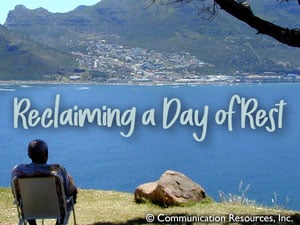Reclaiming a Day of Rest

True confession: I am a chronic commandment-breaker. I do it every week. In fact, my job as a pastor demands it. Every Sunday, I go to work and violate the Fourth Commandment: “Remember the sabbath day, and keep it holy” (Exodus 20:8). I’m sure that most of you do the very same.
Now it’s true that those of us on “temple duty” have long been excused from the Sabbath obligation because of our work, but the irony of Sabbath-enforcers being Sabbath-breakers is not lost on me. Nor is the fact that our Sabbath habits are shared by ever growing numbers of people, who work or shop or play organized sports on Sundays. We’ve lost our day of rest, and this concerns me, because I’m convinced that nonstop activity harms people — it threatens our health as individuals and as a society.
So what can we do to reclaim the Fourth Commandment, as summer turns to fall and we ramp up our stressful workday and school-year schedules?
The place to begin is to see that a day of reflection and relaxation is a performance-enhancer, not a productivity-robber. A friend who is a priest and long-distance runner reports that an almost universally recognized training principle is that a runner becomes faster by taking a day off from training each week. “The Sabbath principle,” he insists, “is built into our physical bodies.” There’s also a saying among artists that you must know when to stop painting — if you don’t, you’ll make one stroke too many and ruin the painting. Overworking can have the same disastrous results as over-painting.
The next step is to assert that we are children of God, not servants to a particular shop, office, firm or corporation. The Sabbath reminds us of this fundamental identity, one that we need to share with our kids — young people who may be thinking they are beholden to school and sports and so many other time-consuming activities. The Sabbath is a reminder that we are more than beasts of burden, more than cogs in a wheel, more than students or workers who are valued for our contributions. On our day of rest, we discover we are valuable simply because we exist.
It seems to me that Jews calculate their days correctly — they start each day in the evening, and begin with the refreshment of a night’s rest. We would all be well served, I believe, by beginning each week with a Sabbath, a day of peace, and using the serenity of that day as the foundation for our ongoing activities. Call me countercultural, even subversive, but I’m convinced that better Sabbath-keeping is a key to rediscovering our God-given identity and enhancing our Monday-through-Friday performance.
So go ahead: Reclaim a day of rest. For a pastor, it may be a Monday instead of a Sunday, but the important thing is to embrace the Sabbath principle. You’ll be amazed by how much better you feel.
Share this Post:
Looking for More?
Imagine having fresh help in preparing your sermons right at your fingertips, especially during those weeks when your words and ideas are not flowing easily. Homiletics Online won’t write the sermon for you but once you’ve used this treasury of solid content, you’ll wonder how you ever got along without it.
Would you like to see your post on this blog?
We are always looking for talented and passionate writers who want to share their ideas on preaching the Gospel. If that sounds like you, then please use the button to submit a guest post.

